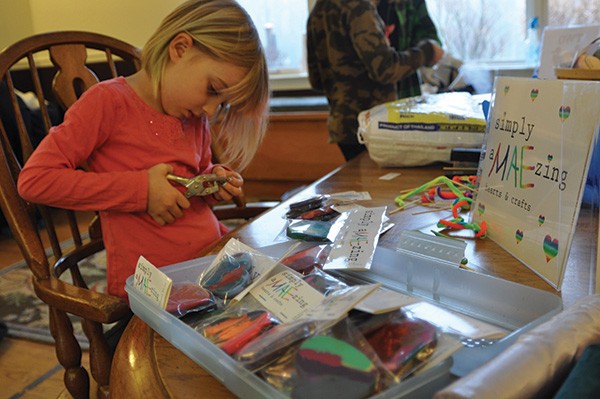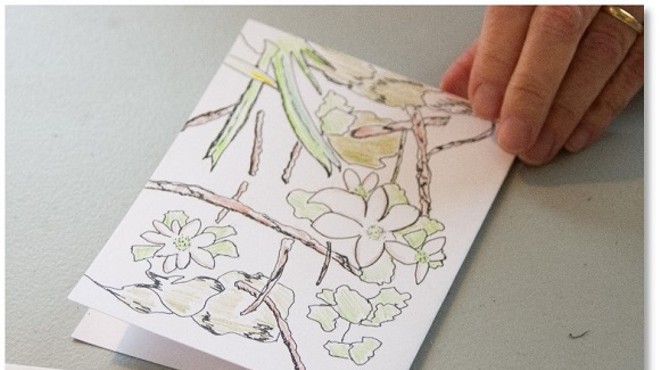Beyond Paper
Gardner's work also finds a natural home at the Birch School in Rock Tavern, an innovative program of the Watershed Learning Center that has evolved from its founder's work with children in settings such as summer camp and homeschooler support. "Birch teachers and mentors create learning experiences that are engaging for different kinds of intelligences," says co-director Kate Fox. "Students try out their skills and discover which learning experiences work best for them. Students choose modalities that they have an affinity for. Information can be gathered for authentic assessment and used to inform further learning processes as the student progresses. They encourage students to reflect on their learning process and help students learn to identify what they are good at."
What that looks like on the ground at Birch is, among other things, "a "Quarterly Student Showcase." "This provides an opportunity for students to display their learning in a variety of ways beyond paper," says Fox. "Student projects, videos, computer programs, sewing projects, posters, experiments, art projects, poetry, music, speeches, PowerPoint presentations, and more are all displayed for the school community to see. Showcase submissions in many modalities allow students to display their skills in the ways they are best at. At any given hour in a school day, some students are working in workbooks and journals, others are using online computer simulations. A group of students does multiplication practice and receives direct instruction in the lab. Some students use the listening center to hear lessons. Others are watching online video lessons. Small groups are playing math games. A student is playing an online drill program in the form of a video game. All Birch School students get plenty of outdoor time, and some students spend even more time outdoors, exploring science through nature study and exploration. Building, programming, robots, creating things, experimental archeology, and inventions are encouraged."
Providing Diverse Options for Learning
Oakwood Friends School in Poughkeepsie is another place where Gardner's understanding is put to considerable use. "We teach to multiple intelligences in grades 6 through 12 all the time," says Anna Bertucci, Oakwood's upper school head and assistant head for academics and student life. "First of all, our emphasis on meaningful teacher-student interactions makes it possible to employ multiple strategies in the classroom. We know our students well and can give individual attention in our small classes. This means we know we have to create different educational experiences for different learners. We also help students to get to know themselves as learners. Creating opportunities for learning through experience and helping individuals create their own meaning is at the heart of Friends education.
"Also, as an independent school we have the freedom to design dynamic classes and curriculum. We not only present material through different modalities, we also assess students through a variety of means. For example, a student who is a kinesthetic learner might act out an important scene from history rather than demonstrate her knowledge in a multiple-choice test format. And with a 66-acre campus, we are able to get out of the classroom often. Students also can choose independent study options that really speak to their areas of strength."
Bertucci makes an important point about the freedom experienced by independent schools—not least, freedom from standardized assessments and imposed curricula. But many public educators are also cognizant of Gardner's work and strive to implement it. New Paltz School District Superintendent Maria Rice is a strong Gardner fan, referencing his Five Minds for the Future extensively in a recent communiqué to district stakeholders. "Success will not derive from the archaic demands of federal and state mandates which still require us to teach and test for the past, for the Industrial Age," she says. "Schools have been forced into being tethered to a skills-based, test-driven educational process that extols the mastery of facts and formula rather than encouraging thinking and creativity." In New Paltz, she states firmly, the goal is to facilitate students in becoming world citizens by whatever means necessary.
So if educators universally comprehend this, why the disconnect between common wisdom and what many see as onerous top-down assessment-driven climate? Indeed, search "multiple intelligence" on the New York State Education website and you'll find absolutely nothing. GBRSS's Greene has an inkling: "I believe that public educators are approaching the same values with a different toolbox," he says. "And at the moment there is a disconnect between capitalism and democracy that's impairing that."


















